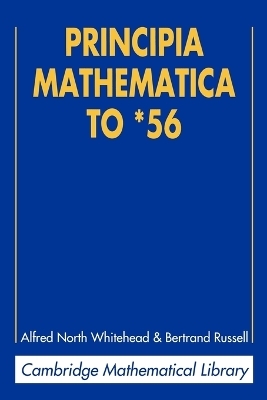
Principia Mathematica to *56
Seiten
1997
|
2nd Revised edition
Cambridge University Press (Verlag)
978-0-521-62606-4 (ISBN)
Cambridge University Press (Verlag)
978-0-521-62606-4 (ISBN)
This abridged text of the great three-volume Principia Mathematica, deservedly the most famous work ever written on the foundations of mathematics, contains the material that is most relevant to an introductory study of logic and the philosophy of mathematics.
The great three-volume Principia Mathematica is deservedly the most famous work ever written on the foundations of mathematics. Its aim is to deduce all the fundamental propositions of logic and mathematics from a small number of logical premisses and primitive ideas, and so to prove that mathematics is a development of logic. This abridged text of Volume I contains the material that is most relevant to an introductory study of logic and the philosophy of mathematics (more advanced students will wish to refer to the complete edition). It contains the whole of the preliminary sections (which present the authors' justification of the philosophical standpoint adopted at the outset of their work); the whole of Part 1 (in which the logical properties of propositions, propositional functions, classes and relations are established); section 6 of Part 2 (dealing with unit classes and couples); and Appendices A and B (which give further developments of the argument on the theory of deduction and truth functions).
The great three-volume Principia Mathematica is deservedly the most famous work ever written on the foundations of mathematics. Its aim is to deduce all the fundamental propositions of logic and mathematics from a small number of logical premisses and primitive ideas, and so to prove that mathematics is a development of logic. This abridged text of Volume I contains the material that is most relevant to an introductory study of logic and the philosophy of mathematics (more advanced students will wish to refer to the complete edition). It contains the whole of the preliminary sections (which present the authors' justification of the philosophical standpoint adopted at the outset of their work); the whole of Part 1 (in which the logical properties of propositions, propositional functions, classes and relations are established); section 6 of Part 2 (dealing with unit classes and couples); and Appendices A and B (which give further developments of the argument on the theory of deduction and truth functions).
Part I. Mathematical Logic: 1. The theory of deduction; 2. Theory of apparent variables; 3. Classes and relations; 4. Logic or relations; 5. Products and sums of classes; Part II. Prolegomena to Cardinal Arithmetic: 6. Unit classes and couples; Appendix A. Type theory of dependant variables and propositions containing apparent variables; Appendix B. Truth functions and others.
| Erscheint lt. Verlag | 11.9.1997 |
|---|---|
| Reihe/Serie | Cambridge Mathematical Library |
| Verlagsort | Cambridge |
| Sprache | englisch |
| Maße | 150 x 232 mm |
| Gewicht | 680 g |
| Themenwelt | Mathematik / Informatik ► Mathematik ► Logik / Mengenlehre |
| ISBN-10 | 0-521-62606-4 / 0521626064 |
| ISBN-13 | 978-0-521-62606-4 / 9780521626064 |
| Zustand | Neuware |
| Haben Sie eine Frage zum Produkt? |
Mehr entdecken
aus dem Bereich
aus dem Bereich
Buch | Hardcover (2012)
Westermann Schulbuchverlag
34,95 €
Schulbuch Klassen 7/8 (G9)
Buch | Hardcover (2015)
Klett (Verlag)
30,50 €
Buch | Softcover (2004)
Cornelsen Verlag
25,25 €



